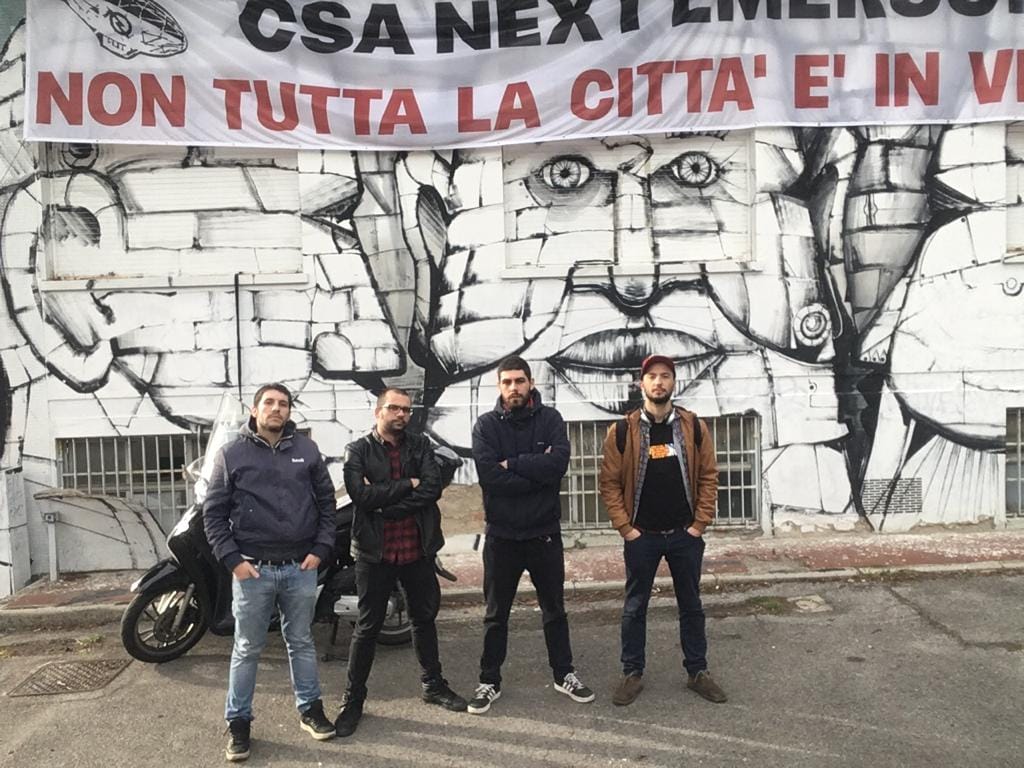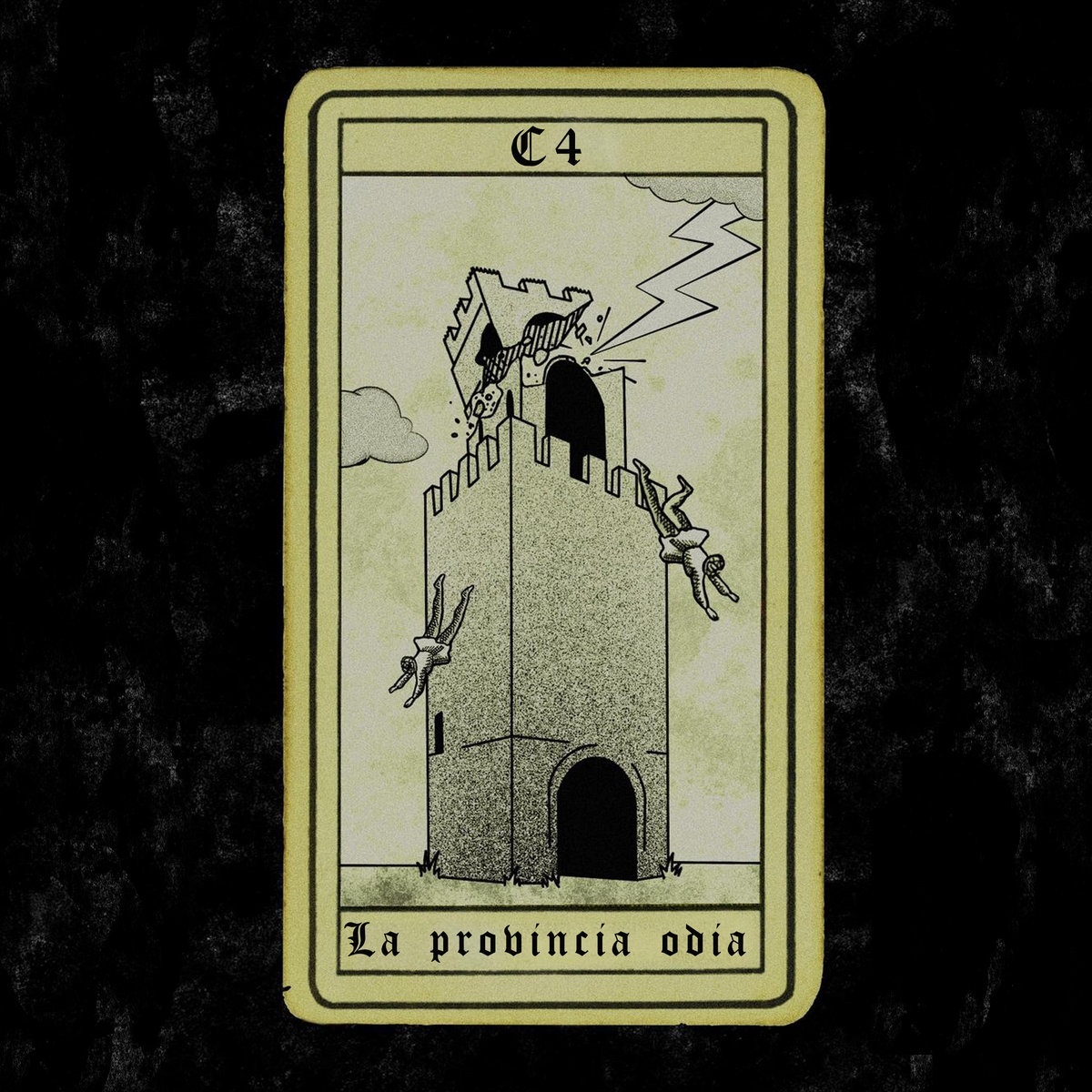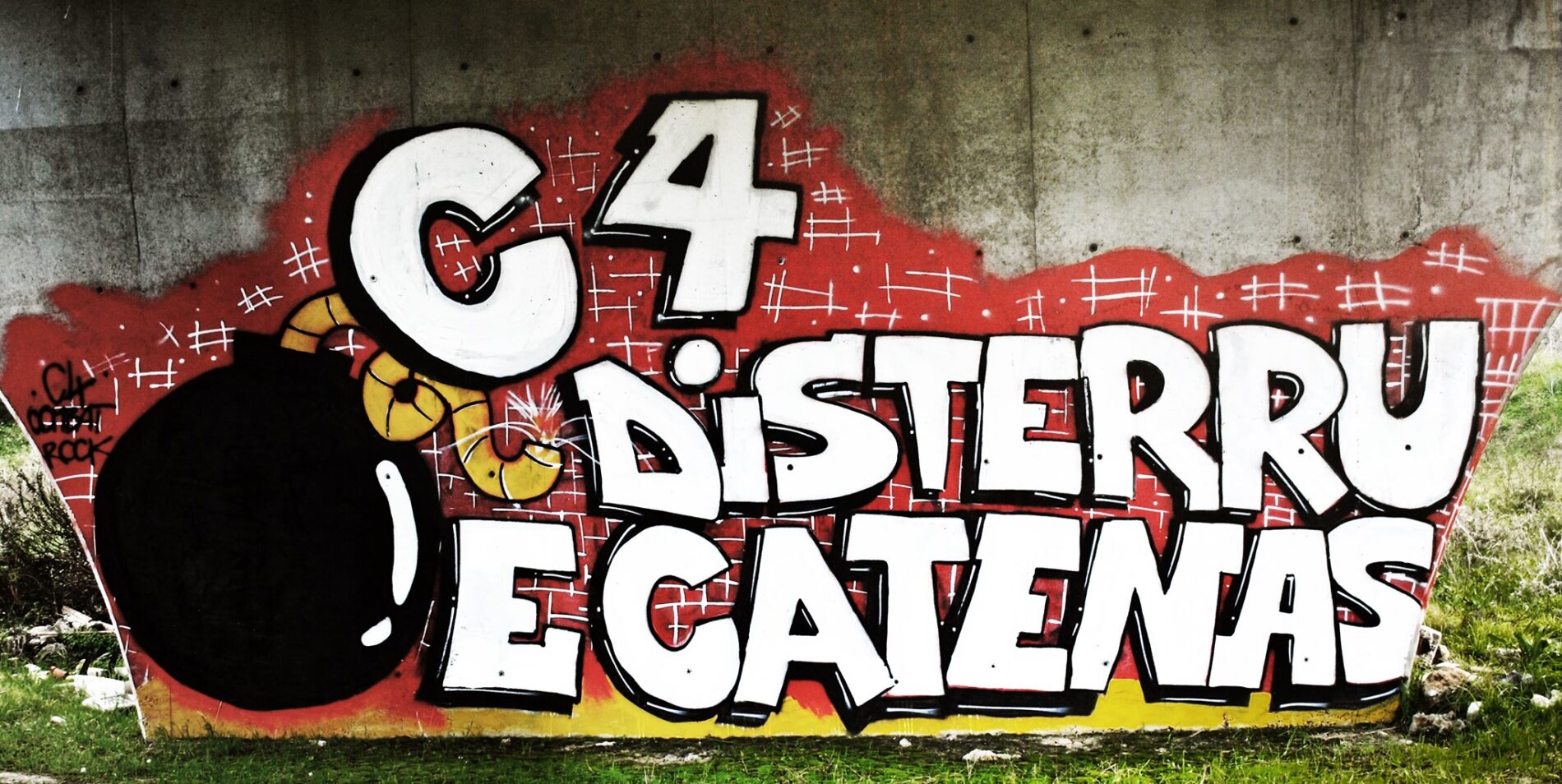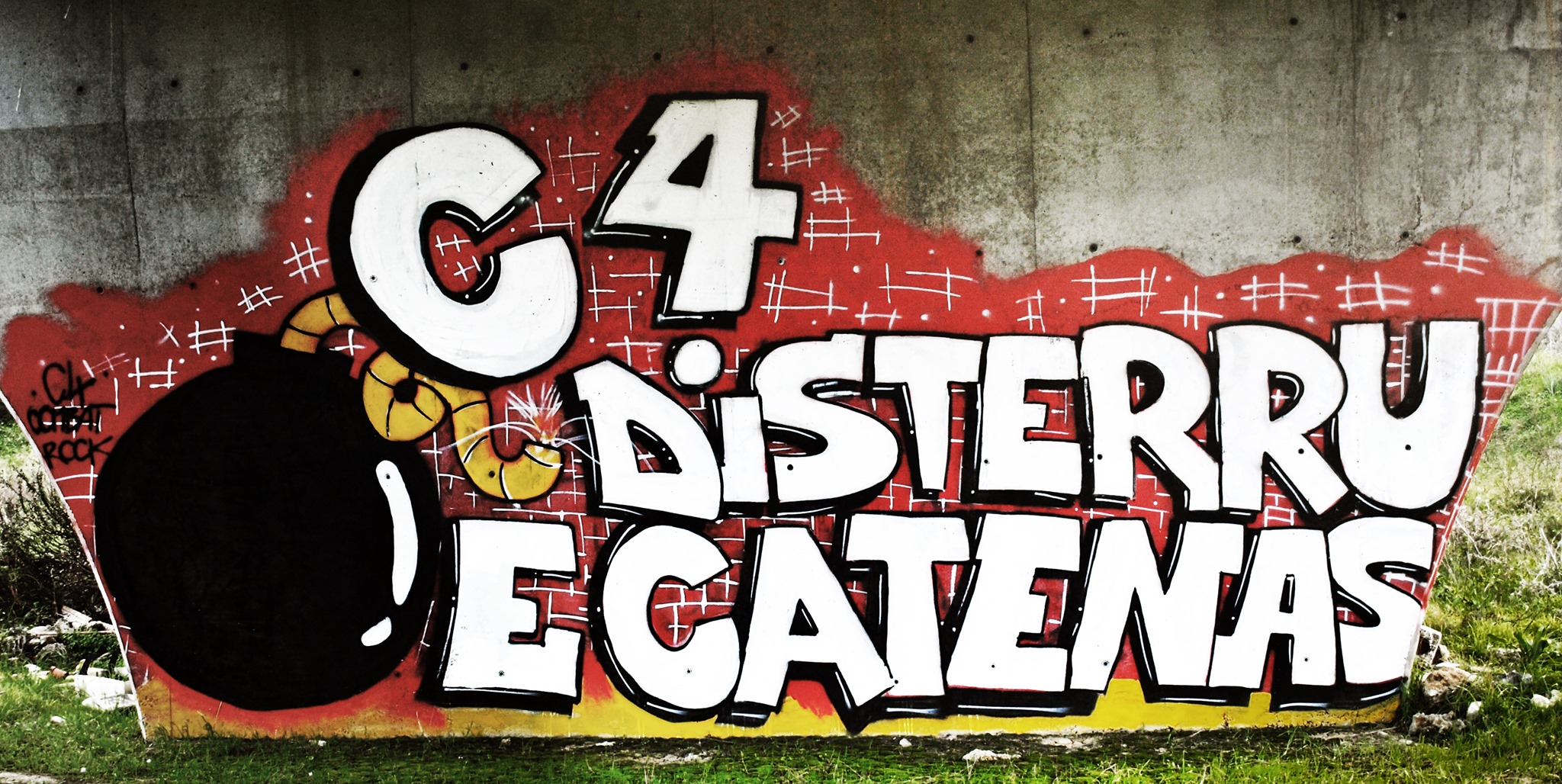‘For us this music means gathering, friendship, social struggle and belonging. This is our stuff, you can’t buy it and you don’t play with it’
In February this year, C4 released their new EP La provincia odia on Fire and Flames. The street punk band already looks back on a fifteen-year history in which anti-fascist issues, social struggles and Sardinian independence have always been at the centre. To introduce the band a bit more, we asked them a few interview questions about their musical development and the political situation in Sardinia. [Find the italian version below]
FF: Chao C4 and welcome to the Fire and Flames family! Can you just introduce yourselves at the beginning: Who stands behind C4? How long have you been around and have you played in other bands before? Do you all live in Sardinia?
C4: The band was born in the summer of 2006 in a small town on the west coast of Sardinia. At the time we were all very young, around 15 years old, and we hardly knew how to play, but we wanted to get involved and create something that would make us escape the boredom of our small reality. C4 was our first experience with music, even though we later played in other bands (Disagio Urbano, Avvolte morti etc.). After a few years playing on different stages all over Sardinia, and after producing our first album, our original guitarist, Mattia, had to emigrate to Holland in 2012. We resumed playing in 2016, inserting on guitars two lifelong friends, Luca (The Defiance) and Fabio (Mankind has fallen). From the initial line-up remain Roberto, who lives in Bologna and plays in Zeman, and Gianluca, who also plays in Coru & Figau.
FF: How would you describe your music, both musically and in terms of content?
C4: In the beginning, we were obsessed with a band called Kenze neke, a Sardinian independence band that were pretty much inspired by The Clash. Our first songs were influenced by their sound, even if you could already hear the influences of the Italian OI! scene. Over time, we turned completely to a street punk/hc sound. We grew up listening to that kind of music, and we’re still very tied with that scene. Also the contents have matured over the years. We’ve always made politically oriented, anti-fascist and independent music, but over time, we realised it was important to focus on the issues we live with every day on our island, talking about our people and our lives, always with an eye on social issues. Roberto writes the lyrics, so Bologna and its reality were also an inspiration for the writing of the last works.

‘Our answer to those who want to sell us as a fictitious paradise for tourists or speculators is this: we are the province that hates.’
FF: What does the title of the album ‘La provincia odia’ refer to?
C4: La provincia odia (The province hates) was born as a counterpoint to the mainstream narrative about small towns and the Sardinian hinterland. In general, these are described as wonderful and idyllic areas, cradles of traditions and ancient knowledge. However, if we look from the inside we often find depopulated villages abandoned by the state, unemployment, undeclared work, social depression, areas polluted and then abandoned by large industries. Our answer to those who want to sell us as a fictitious paradise for tourists or speculators is this: we are the province that hates.

FF: What are the songs on the EP about? Can you briefly introduce the songs?
C4: The first track of the EP Sàmbini a soi (Blood in the sun) is a song we are very proud of. It speaks of the Bugerru massacre, a historical event that took place in 1904 in Sulcis, a mining area of Sardinia. The mines at the time were in the hands of large French or Belgian companies. During a workers’ strike, the royal army fired on the demonstrators, killing four of them and wounding many others. There were plenty of solidarity strikes afterwards, and revolts all over Italy. We played in Bugerru many years ago, and this story impressed us a lot, because it is still alive and felt in the community. We wanted to tell it. Biddas Scarèscias (Forgotten Countries) speaks clearly and frankly about the reality of our region. From unemployment, to alcoholism, up to the cultural sell-off dictated by the big industry of tourism, which in Sardinia provides jobs but also creates many disasters. Costruito in Sardegna (Built in Sardinia) is an autobiographical song. In 2021 our band turns 15. We wanted to dedicate a song to this long journey that in many ways has changed our lives, and will continue to do so. Finally, Figli di papà is a state of indictment against ‘poser punk’. For us this music means gathering, friendship, social struggle and belonging. We’ve always had a problem with the fucking bourgeoisie who were playing at being punks, the ones who talk about working class but never broke their backs in a field or on a construction site. This is our stuff, you can’t buy it and you don’t play with it.
FF: How did you actually come to Fire and Flames as a label?
C4: As fans of this music, we have always looked at Fire and Flames with admiration. A fierce music label with a keen eye on anti-fascism and social struggles was what interested us for our music. Our position is not always easy. Many people, even in Italy, mistake our independence ideas for nationalist bullshit such as those carried out from Lega Nord, for example. We presented ourselves as what we are, considering Fire and Flames as a perfect home for our music. And with great pleasure we were welcomed with open arms. This collaboration fills us with pride.
FF: Your video for the song Biddas scarèscias is set in an abandoned factory. Is this emblematic of the economic and social situation of Sardigna? And does it represent the situation of the workers’ movement, which has been weakened or even disappeared by de-industrialization and economic decline? Or are there perhaps also beginnings of a renewal of the workers’ movement?
C4: The place where we set the Biddas scarèscias video is a former sugar factory, in our town, in Silì. On our last album, Disterru e catenas, we also chose to put a factory on the cover, not by chance. In the 60s and 70s, Sardinia was heavily industrialised by the Italian state. They said they would turn shepherds into blue-collar workers, promising a better future. Instead, the industrial centres opened in those years are now almost all closed, and behind them, they have left only ruins and pollution. Sardinia never had a large labor movement. It was and remains a predominantly agro-pastoral society, and even in these cases, due to the nature of these works, we often live in isolationism and it is difficult to create large workers’ movements in the countryside. It happened a few years ago with miners, recently with the shepherds, and each time the medicine was to give some public funding to put an end to these discontents. It’s always difficult to organise a collective struggle, but it’s essential not to reduce the conflict to the large centres, which in Sardinia represent a minority of the population.
FF: The song clearly states ‘Sardigna no est italia’ – can you briefly explain the historical reasons for the independence movement and what significance it has today? And are there explicit leftist demands in the question, for example, for a socialist Sardinia or who dominates the debate?
C4: The reasons for Sardinian independence are centuries old, and have never completely died out since their emergence. They return to the political landscape cyclically. The Italian state, since before its very birth, under Piedmontese rule has always treated our island as a colony, annihilating our culture, prohibiting the use and teaching of our language and using poverty as a weapon of blackmail to make us economically and politically dependent on Italy.

FF: Are there otherwise active progressive movements or structures on Sardinia?
C4: First of all, we can say that fortunately among the independence movement in Sardinia there is no fascist shit. The fascists in Sardinia are all Italianists, servants not only of the capital but also of the history. Until a few years ago, there was a very active communist party, called A manca pro s’indipendentzia, which unfortunately was hit by Italian repression, with the arrest of about twenty of its leaders, falsely accused of terrorism. Today the scenario is more fragmented within the independence left, but there are movements that work a lot in the area. The most active in recent years is A Foras, a collective that brings together comrades, separatists, anarchists, pacifists etc. and that fights against the enormous NATO military servitudes present in Sardinia.
‘It was important for us to receive support at a time like this, with Covid changing our lives profoundly. But the support and unity we found showed us that a fucking pandemic won’t stop us!’
FF: What should you do when you are in Sardinia (Bars, cafes, social centers, memorials, concert venues)? And what bands can you recommend from the area or the mainland currently?
C4: Sardinia is pretty big! A few places I can recommend are definitely Orgosolo, a town full of murals with a significant history of anti-militarist struggle, definitely the museum of Gramsci, one of the greatest communist intellectuals in history and if you are in Cagliari you have to go to Sa Domu, the social center and the comrades of Su Tzirculu and Baracca Rossa. As for the bands, in Sardinia keep an eye on A Fora de Arrastu, HC band from Cagliari and Coru & Figau. And if you like the sound of more old-fashioned OI!, there are many old bands in Sardinia that deserve a listen: 4 moors, Adunata, Ciruma Skins, Sezione ribalta.
FF: Thanks so much for the interview and the collaboration as well! Do you want to say anything in closing?
C4: It was important for us to receive support at a time like this, with Covid changing our lives profoundly. But the support and unity we found showed us that a fucking pandemic won’t stop us! Thank you for the interview!
Italian Version
1 – I C4 nascono nell’estate 2006 in un piccolo paese della costa ovest della Sardegna. Al tempo eravamo tutti molto piccoli, avevamo intorno ai 15 anni e non sapevamo praticamente suonare, ma volevamo metterci in gioco e creare qualcosa che ci facesse fuggire alla noia della nostra piccola realtà. Per tutta la prima formazione i C4 sono stati la prima esperienza con la musica, anche se poi abbiamo suonato in altre band (Disagio urbano, Avvolte morti etc.). Dopo un po’ di anni passati tra i palchi della Sardegna, e dopo aver prodotto il nostro primo album, il nostro chitarrista storico, Mattia, è dovuto emigrare in Olanda nel 2012. Abbiamo ripreso a suonare nel 2016, inserendo alle chitarre due amici di sempre, Luca (The Defiance) e Fabio (Mankind has fallen). Della formazione iniziale rimangono Roberto, che vive a Bologna e suona anche negli Zeman, e Gianluca, che invece suona nei Coru&Figau.
2 – Agli inizi eravamo fissati con i Kenze neke, una band indipendentista sarda di stampo prettamente clashano. I primi nostri pezzi si ispiravano al loro sound, anche se già si potevano sentire le influenze della scena OI! italiana. Col tempo comunque abbiamo virato completamente su un sound street punk/hc. Siamo figli di quella musica, ci siamo cresciuti e ancora oggi frequentiamo quegli ambienti. Anche i contenuti hanno subito una maturazione negli anni. Abbiamo sempre fatto musica politicizzata, di stampo antifascista e indipendentista, ma col tempo, abbiamo capito che era importante concentrarsi sui temi che ogni giorno viviamo nella nostra isola, parlare della nostra gente e del nostro vissuto, sempre con un occhio puntato sulle questioni sociali. Chi scrive i testi è Roberto, quindi anche Bologna e la sua realtà sono state di ispirazione per la scrittura degli ultimi lavori.
3 – “La provincia odia” nasce in contrapposizione alla narrazione mainstream che viene fatta riguardo i piccoli paesi e l’entroterra Sardo. In genere queste realtà vengono descritte come zone meravigliose e idilliache, culle di tradizioni e di saperi antichi. Se si guarda però dall’interno spesso troviamo paesi spopolati e abbandonati dallo stato, disoccupazione, lavoro nero, depressione sociale, zone inquinate e poi abbandonate da grandi industrie. La nostra risposta a chi vuole venderci come un paradiso fittizio per turisti o speculatori è questo, noi siamo la provincia che odia.
4 – La prima traccia dell’EP Sàmbini a soi (Sangue al sole) è un pezzo a cui siamo molto affezionati. Parla dell’Eccidio di Bugerru, un fatto storico avvenuto nel 1904 nel Sulcis, una zona mineraria della Sardegna. Le miniere al tempo erano in mano a grandi società francesi o belghe. Durante uno sciopero operaio, l’esercito reale sparò sui manifestanti, uccidendone 4 e ferendone molti altri. Ci furono molti scioperi di solidarietà in seguito, e tante rivolte in tutta Italia. Suonammo a Bugerru tanti anni fa, e questa vicenda ci impressionò molto, perchè è ancora viva e sentita nella comunità. Ci tenevamo a raccontarla.
Biddas Scarèscias (Paesi dimenticati) parla in maniera chiara e schietta della realtà dei nostri paesi. Dalla disoccupazione, all’alcolismo, fino alla svendita culturale dettata dalla grande industria del turismo, che in Sardegna da lavoro ma crea anche tanti disastri.
Costruito in Sardigna è un pezzo autobiografico. Nel 2021 la band compie 15 anni. Abbiamo voluto dedicare un pezzo a questo lungo percorso che per molti versi ci ha cambiato la vita, e continuerà a farlo.
Figli di papà infine è uno stato di accusa contro il fighettismo punk. Per noi questa musica è aggregazione, amicizia, lotta sociale e appartenenza. Ci sono sempre stati sul cazzo i borghesi che giocavano a fare i punk, quelli che parlano di working class ma non si sono mai spezzati la schiena in un campo o in un cantiere. Questa è roba nostra, non si compra e non ci si gioca per fare i pagliacci.
5 – Da fans di questa musica abbiamo sempre guardato la Fire and Flames con ammirazione. Un’etichetta di musica feroce con uno sguardo sempre attento all’antifascismo e alle lotte sociali era ciò che ci interessava per la nostra musica. La nostra posizione non è sempre facile. Tanti, anche in Italia, scambiano le nostre idee indipendentiste con cazzate nazionaliste come quelle portate avanti dalla lega nord , per fare un esempio. Ci siamo presentati per ciò che eravamo, vedendo nelle Fire and flames una casa su misura per la nostra musica, e con grande piacere siamo stati accolti a braccia aperte. Questa collaborazione ci riempie di orgoglio.
6 – Il luogo dove abbiamo ambientato il video di Biddas scarèscias è un ex zuccherificio, che si trova proprio nel nostro paese, a Silì. Anche nel nostro ultimo album, “Disterru e catenas” abbiamo scelto di mettere in copertina una fabbrica, non a caso. Negli anni 60-70 in Sardegna ci fu una pesante industrializzazione voluta dallo stato Italiano. Dicevano che avrebbero trasformato i pastori in operai, promettendo un futuro migliore. Invece i poli industriali aperti in quegli anni oggi sono quasi tutti chiusi, e dietro di loro hanno lasciato solo macerie e inquinamento. La Sardegna non ha mai avuto un grosso movimento operaio. Era e rimane una società prevalentemente agro-pastorale, ed anche in questi casi, per la natura di questi lavori, spesso si vive nell’isolazionismo ed è difficile che si creino nelle campagne dei grossi movimenti di lavoratori. È successo qualche anno fa coi minatori, di recente coi pastori, e ogni volta la medicina è stata dare qualche finanziamento pubblico perchè questi malumori si spegnessero. Fare un discorso di lotta collettiva è sempre difficile, ma è fondamentale per non relegare la conflittualità ai grandi centri, che in Sardegna comunque rappresentano una minoranza della popolazione.
7 – Le ragioni dell’indipendentismo Sardo sono antiche di secoli, e da quando sono nate non si sono mai spente del tutto. Tornano nel panorama politico ciclicamente. Lo stato Italiano, fin da prima della sua stessa nascita, col dominio Piemontese ha sempre trattato la nostra isola come una colonia, annichilendo la nostra cultura, vietando l’uso e l’insegnamento della nostra lingua e usando la miseria come arma di ricatto per farci dipendere economicamente e politicamente dall’Italia.
8 – Possiamo innanzitutto dire che fortunatamente tra le file indipendentiste in Sardegna non c’è merda fascista. I fascisti in Sardegna, sono tutti italianisti, servi oltre che del capitale, anche della storia. Fino a qualche anno fa era molto attivo un partito comunista, che si chiamava “A manca pro s’indipendentzia”, che purtroppo fu colpito dalla repressione italiana, con l’arresto di una ventina dei suoi capi dirigenti, accusati falsamente di terrorismo. Oggi lo scenario è più frammentato anche nella sinistra indipendentista, ma ci sono movimenti che lavorano tanto sul territorio. Il più attivo negli ultimi anni è “A Foras” un collettivo che riunisce compagni, indipendentisti, anarchici, pacifisti etc. e che lotta contro le enormi servitù militari NATO presenti in Sardegna.
9 – La Sardegna è bella grossa!! un po’ di luoghi che mi sento di consigliare sono sicuramente Orgosolo, un paese pieno di murales con una grande storia di lotta antimilitarista alle spalle, per i più studiosi c’è la casa museo di Gramsci, uno dei più grandi intellettuali comunisti della storia, poi se passate da Cagliari passate a Sa Domu, il centro sociale e dai compagni de “Su Tzirculu” e della “Baracca rossa”. Per quanto riguarda le band, in Sardegna tenete d’occhio gli A Fora de Arrastu, band HC del cagliaritano e i Coru&figau. Se poi vi piace il sound OI! Vecchio stile, ci sono tante vecchie band in Sardegna che meritano un ascolto: 4 moors, Adunata, Ciruma Skins, Sezione ribalta.
10 – Per noi è stato importante ricevere supporto in un periodo come questo, col Covid che ha cambiato profondamente le nostre vite. Ma il supporto e l’unità che abbiamo trovato ci hanno dimostrato che non sarà una pandemia del cazzo a fermarci! Grazie a voi dell’intervista!




